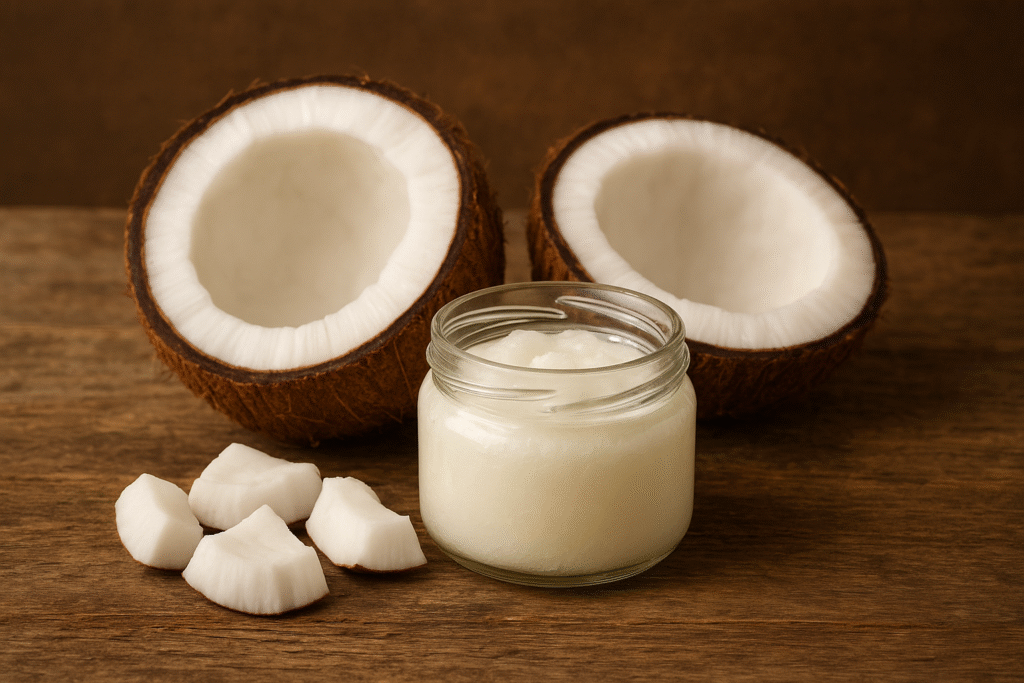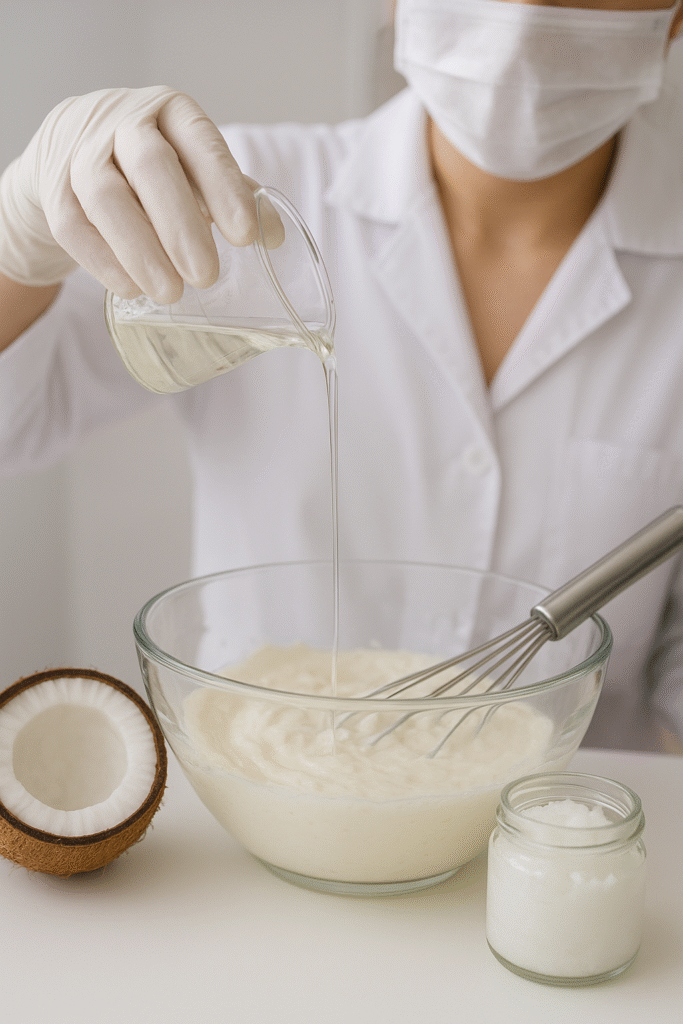🌴 What is Coconut Oil?

Coconut oil is a creamy, aromatic fat extracted from the meat (kernel) of mature coconuts harvested from the Cocos nucifera tree—widely grown across Southeast Asia, the Pacific Islands, the Caribbean, and coastal Africa. It has been a dietary staple and healing salve in tropical cultures for centuries.
Today, this “oil of a thousand uses” plays a starring role in everything from frying pans and face masks to biodiesel and baby products. Whether you’re a homesteader making your own soap or a formulator crafting vegan snacks, coconut oil offers an unrivaled blend of versatility, shelf stability, and natural goodness.
🏡 Cottage Uses of Coconut Oil
In coconut-producing regions, coconut oil is often made using traditional cold-pressing or wet-processing methods. This small-scale, hands-on extraction process typically involves:
- Grating and drying coconut meat
- Pressing or boiling to release the oil
- Filtering for purity
This yields virgin or cold-pressed coconut oil, used locally for:
- Cooking: A staple fat for frying, sautéing, and baking
- Haircare: Used as a deep conditioner, scalp treatment, and anti-frizz serum
- Skincare: Applied to dry skin, cracked heels, and for infant massage
- Herbal infusions: Used as a carrier oil in traditional medicine, infused with turmeric, neem, or other botanicals
Many coastal families also make medicated coconut oil using local herbs, and sell small jars at markets—supporting household income and preserving indigenous knowledge.

🏭 Industrial Applications of Coconut Oil
The global coconut oil market was valued at over $5 billion in 2024, with demand surging in food, beauty, and wellness industries. Its high stability, pleasant aroma, and antimicrobial properties make it a go-to natural ingredient across multiple sectors.
🍳 1. Food Industry
Coconut oil is prized for:
- High-heat cooking: Excellent for frying, baking, and roasting
- Plant-based spreads: Used in vegan butters and cheeses
- Non-dairy creamers and confectionery: Adds richness and texture
- Functional foods: Popular in paleo, keto, and raw food diets
Its medium-chain triglycerides (MCTs)—especially lauric acid—are believed to support energy metabolism and gut health, making it a staple in nutritional supplements and wellness powders.
💄 2. Cosmetics & Personal Care
Coconut oil is one of the most widely used natural oils in skincare due to its:
- Moisturizing and emollient properties
- Natural fragrance and smooth texture
- Antimicrobial action, especially against skin bacteria and fungi
Found in everything from lip balms and deodorants to cleansing oils, soaps, and makeup removers, it’s a cornerstone of clean beauty formulations.
🔧 3. Industrial & Alternative Uses
- Bio-lubricants and biodiesel: A sustainable alternative in machinery and transport
- Soaps and detergents: Rich in lauric acid, coconut oil creates hard, cleansing bars
- Plastic-free packaging and candles: Used in eco-friendly product design

🌿 Health Benefits of Coconut Oil
Coconut oil’s popularity isn’t just hype—it’s backed by centuries of use and a growing body of research into its functional properties.
✅ Key Benefits:
- Antimicrobial action: Lauric acid fights off bacteria, fungi, and some viruses
- Brain fuel: MCTs may support cognitive function and energy in low-carb diets
- Skin repair: Moisturizes, soothes, and helps restore the skin barrier
- Hair health: Penetrates the hair shaft to reduce protein loss and breakage
⚠️ Note: While some health claims remain under debate, coconut oil is best consumed in moderation—especially in its refined form, which is higher in saturated fats.
🌍 Sustainability & Ethics
Like many tropical commodities, coconut oil’s growth has raised both opportunities and concerns. Luckily, community-led models are helping to ensure a fairer, greener supply chain.
🌱 Environmental Impact
- Coconut palms require minimal synthetic inputs and thrive in coastal, saline soils
- Unlike oil palm, coconut is less linked to deforestation, though climate stress is a concern
- Intercropping systems with cacao, banana, or spices help preserve biodiversity
🤝 Fair Trade & Women’s Empowerment
- Many women-led cooperatives in the Philippines, Sri Lanka, and Indonesia now process and export virgin coconut oil
- Certifications like Fair Trade, Organic, and Rainforest Alliance help ensure ethical sourcing and traceability
✍️ Final Thoughts
Coconut oil is more than just a trend—it’s a versatile, culturally rooted, and globally relevant product that continues to support traditional livelihoods and cutting-edge innovation alike. Whether you’re sautéing veggies, whipping up a body butter, or formulating a clean-label snack, this tropical titan is hard to beat.
Curious how coconut oil compares to palm kernel or babassu oil? Follow our blog and don’t miss our upcoming “Tropical Oils Face-Off” feature.
📚 References
- DebMandal, M., & Mandal, S. (2011). Coconut (Cocos nucifera L.): A potential plant for health benefits. Journal of Advanced Pharmaceutical Technology & Research, 2(2), 89–98.
- Dayrit, F. M. (2014). The properties of lauric acid and their significance in coconut oil. Journal of the American Oil Chemists’ Society, 91(1), 1–15.
- USDA National Nutrient Database. (2024). Coconut oil, virgin and refined.
- Fair Trade USA. (2023). Impact Report: Coconut Oil Supply Chains.
Market Research Future. (2024). Global Coconut Oil Market Forecast Report.


Leave a Reply